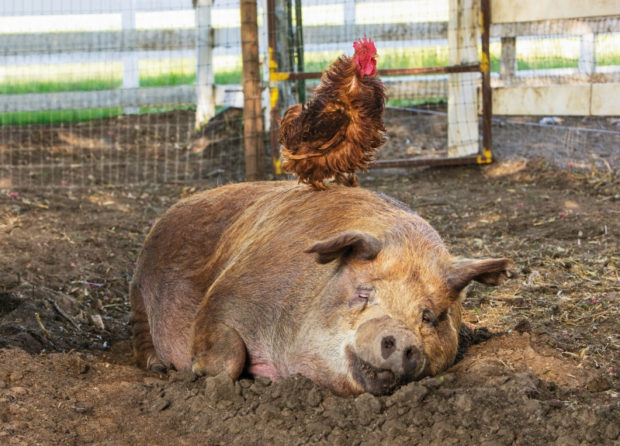 A documentary tells of a couple’s struggle to create and maintain an organic farm that is totally in harmony with nature.
A documentary tells of a couple’s struggle to create and maintain an organic farm that is totally in harmony with nature.
It might just be because I’m a city boy at heart, but I think it’s very difficult for a movie to make farming seem interesting. So I’m very impressed that a new film called The Biggest Little Farm manages to do just that. The director, John Chester, started out as a cinematographer and a director of nature films, and his strong visual sense really pays off, conveying the intricate details and the living texture, so to speak, of a farm, and a very unusual farm at that.
This is a true inside look, because this is Chester’s own farm, and that of his wife Molly, a former chef and food blogger. Molly’s passion for natural organically produced food, helped lead them to a decision, in 2010, to buy around 200 acres of land in Ventura County, about an hour north of Los Angeles. The soil was exhausted by years of monoculture farming, and the California drought had starved the trees and other vegetation. The Chesters’ dream was to create a kind of paradise, a habitat for plants and animals that would be in harmony with nature—no pesticides, no cages, no factory farm methods at all.
Not knowing enough about how to proceed, they enlisted the help of an old hippie and biodiversity expert named Alan York. His advice was to create maximum diversity, which would eventually become a self-sustaining environment. To that end, they enriched the soil with manure, planted 76 different varieties of fruit trees, and obtained a large number of animals: chickens, ducks, sheep, and eventually pigs. They didn’t use the animals for meat—the beasts simply roamed about, helping to make the soil ever richer with their droppings, and in the case of the chickens, also producing eggs. As initially described, it looks like a marvelous fairy tale, with John and Molly in the middle of a cute, almost magical nature preserve.
And if this were all it took, the film would be, frankly, kind of boring. But what’s interesting here is that the idealism runs smack against reality. Wild fauna are attracted to the land as well, which is good, but then there is the predictable problem of pests. Birds are eating the fruit; snails are eating the leaves and branches; gophers are gnawing at the roots; and worst of all, coyotes regularly sneak in and kill chickens by the score. The film becomes a vivid portrayal of the incredibly hard work, suffering, and disappointment involved in sustaining this farm. Alan York died of cancer in 2014, so the Chesters are left to try to solve these problems on their own. It’s the great virtue of The Biggest Little Farm that it doesn’t try to gloss over the pain and the death experienced during this process. Nature isn’t always a happy little bedtime story—killing is an integral part of the cycle.
I had a few small reservations. This farm turns out to be a huge operation, with lots of employees, so in some ways the story is rather atypical for organic farming today. We are told that they originally had somebody backing the project with starting funds—and it must have been a lot of money, but this is only a vague detail. The Chesters are vegetarian, but at one point their financial situation causes them to ship off most of their pigs “to market,” which is a euphemism I’m sure anyone can see through, but this little incident, although not concealed, is also not closely examined.
These issues are minor, however, because the main thrust of the picture, its depiction of the real effort and struggle involved in the farm, is so fascinating, and the film also conveys, in a way that I had never quite seen before, the sheer joy and the fun involved as well. The Biggest Little Farm has a message of hope—that sustainable farming, sustainable living, is real and possible, and a viable way forward for our society, if we would only make that choice.

In 1877, the owners of a Swiss clock and watch factory constantly time their employees’ performance, while the workers organize one of the first...

Mati Diop’s first feature tells of a young woman in Senegal, grieving the loss of her lover who died at sea trying to migrate...

A pub owner in a depressed town in northern England helps welcome Syrian refugees into the community. British director Ken Loach announced his retirement...